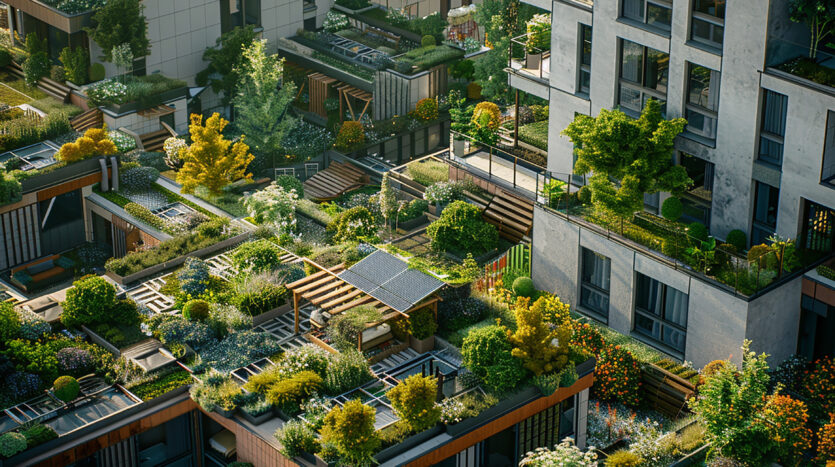Sustainable Development Practices in Gated Communities
Sustainable development has become a cornerstone of modern real estate, particularly in gated communities, where there is a growing demand for environmentally responsible living. Developers are increasingly incorporating sustainable practices into their projects, not just to meet regulatory requirements but also to attract environmentally conscious buyers.
Green Building Certifications
One of the most significant steps towards sustainability in gated communities is obtaining green building certifications, such as LEED (Leadership in Energy and Environmental Design) or IGBC (Indian Green Building Council). These certifications ensure that the construction process and the materials used are environmentally friendly. Developers are incorporating energy-efficient systems, such as solar panels, rainwater harvesting, and waste management systems, to meet these certification standards. These practices not only reduce the carbon footprint of the community but also lower operational costs for residents.
Energy Efficiency
Energy efficiency is a critical component of sustainable development. Gated communities are increasingly equipped with energy-efficient appliances, LED lighting, and smart home systems that allow residents to monitor and reduce their energy consumption. Additionally, the use of renewable energy sources, such as solar power, is becoming more common. By integrating solar panels into the design of homes and common areas, gated communities can generate a significant portion of their energy needs, reducing reliance on non-renewable sources.
Water Conservation
Water scarcity is a pressing issue in many regions, making water conservation a priority in sustainable development. Gated communities are adopting various water-saving technologies and practices, including rainwater harvesting systems, greywater recycling, and low-flow plumbing fixtures. These systems help reduce water consumption and ensure a sustainable water supply for the community. Additionally, landscape designs are being adapted to include drought-resistant plants and efficient irrigation systems, further contributing to water conservation efforts.
Waste Management
Effective waste management is essential for maintaining a sustainable environment. Gated communities are implementing comprehensive waste management systems that include recycling programs, composting facilities, and waste segregation at the source. By reducing the amount of waste sent to landfills, these communities are minimising their environmental impact. Some communities are also exploring waste-to-energy technologies, which convert organic waste into energy, providing an additional source of renewable energy.
Sustainable Landscaping
The design and maintenance of outdoor spaces play a crucial role in the sustainability of gated communities. Sustainable landscaping practices, such as using native plants, organic fertilisers, and efficient irrigation systems, are becoming standard. These practices not only enhance the aesthetic appeal of the community but also support local biodiversity and reduce the need for chemical inputs. Green spaces, such as parks, gardens, and walking trails, are also being integrated into the design of gated communities, providing residents with access to nature and promoting a healthy lifestyle.
Eco-Friendly Transportation
Transportation is a significant contributor to greenhouse gas emissions. To mitigate this, gated communities are encouraging eco-friendly transportation options. Many communities now offer electric vehicle (EV) charging stations, bike-sharing programs, and well-planned pedestrian pathways to reduce reliance on fossil fuel-powered vehicles. Some communities are even implementing carpooling initiatives and shuttle services to reduce the number of vehicles on the road, further decreasing the community’s carbon footprint.
Community Involvement and Education
Sustainability is not just about infrastructure; it’s also about fostering a culture of environmental responsibility among residents. Gated communities are increasingly focusing on educating residents about sustainable living practices. Workshops, seminars, and community events centred around topics like waste reduction, energy conservation, and water-saving techniques are becoming more common. By involving residents in sustainability initiatives, gated communities can create a collective effort toward a more sustainable future.
Smart Technology Integration
The integration of smart technology is revolutionising sustainable living in gated communities. Smart metres, automated lighting, and climate control systems allow residents to monitor and optimise their energy and water usage. These technologies provide real-time data, enabling more efficient resource management and reducing waste. Smart grids are also being implemented in some communities, allowing for better energy distribution and reducing the strain on local power supplies.
Conclusion
Sustainable development practices in gated communities are transforming the way we think about residential living. By integrating energy-efficient systems, water conservation methods, effective waste management, and eco-friendly transportation, these communities are paving the way for a greener future. As awareness of environmental issues continues to grow, sustainable development will become an increasingly important factor in the real estate market, making gated communities an attractive option for eco-conscious buyers.
In the long run, sustainable practices not only benefit the environment but also enhance the quality of life for residents, creating healthier, more resilient communities. By continuing to innovate and adopt new technologies, gated communities can set a benchmark for sustainable living and inspire broader change in the real estate industry.

